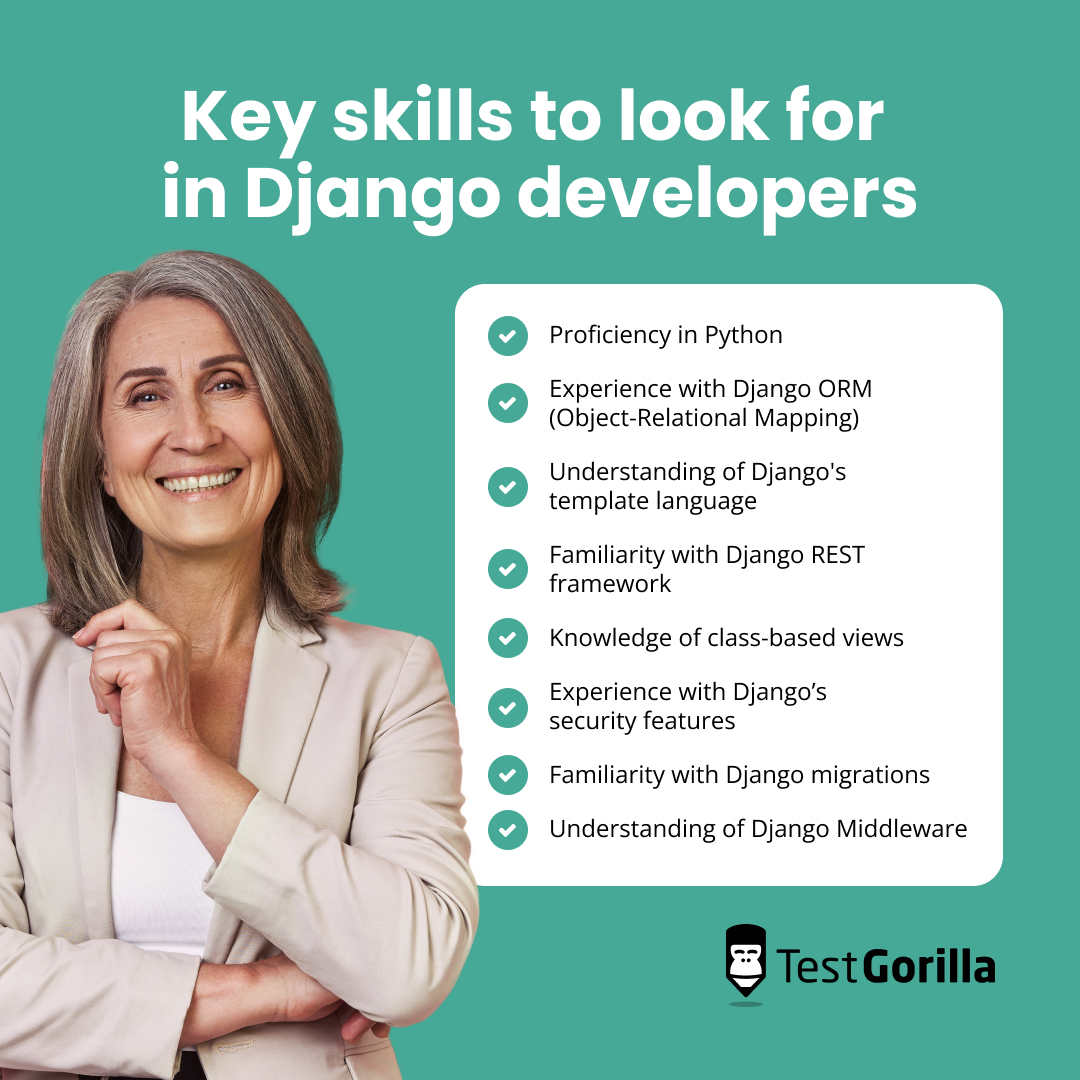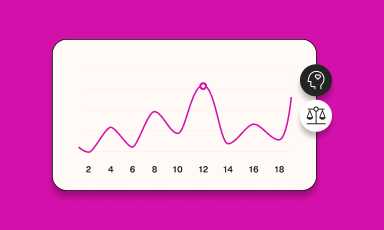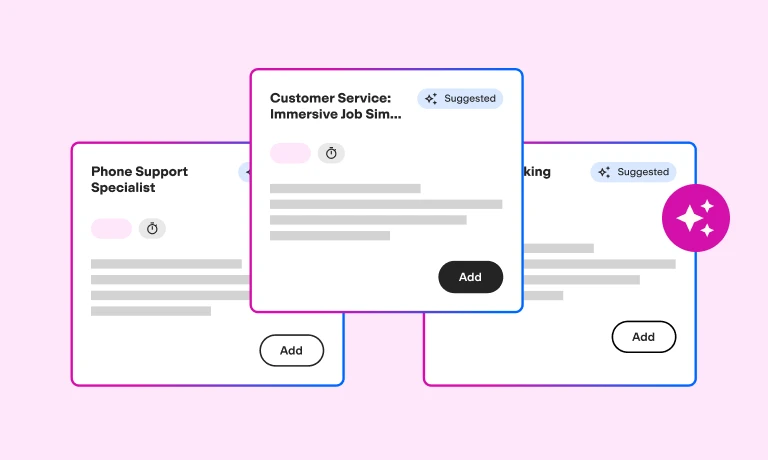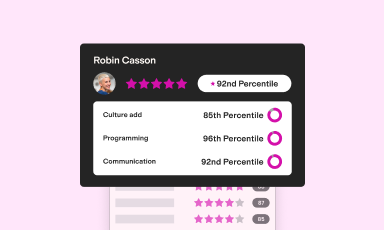Crafting a compelling job description is an essential first step to attracting top-tier Django developers.
But there’s more to Django – and those who use it – than meets the eye.
To write a strong job description and draw in talented developers, you need to consider all of Django’s components, such as cloud-based views and the Django template language, as well as the dynamic community at the core of Django development.
In this article, we explore the key skills to look for in your applicants and best practices for hiring Django developers. You’ll also find a job description template you can start using today.
Let’s dive in.
Table of contents
- What is a Django developer?
- Key skills to look for in Django developers
- How to write an effective Django developer job description
- Django developer job description template
- 3 things to avoid when writing a job description for Django developers
- Next steps: Attracting and assessing Django developers
- FAQs
- Hire the right Django developer with TestGorilla today
What is a Django developer?
A Django developer specializes in using Django, a Python-based development tool, to build and maintain websites and web apps. They focus on server-side logic, ensuring good performance and responsiveness to requests from the front end.
Django developers typically handle data exchange between servers and users, integrating the application with other web services, and maintaining the underlying codebase – all while adhering to best practices in security and scalability.
Key skills to look for in Django developers
In addition to the skills you should look for when hiring a web developer, be sure to consider the following for Django developers specifically:
Proficiency in Python. Since Django is built on Python, developers should be adept in this programming language. (Tip: Use these tests for Python developers from TestGorilla to evaluate your candidates’ coding proficiency.)
Experience with Django ORM (Object-Relational Mapping). This is Django's tool for database queries. Mastery of Django ORM is vital for efficient database handling and reducing complex database operations.
Understanding of Django's template language, a crucial system for generating HTML from data. It’s used to create dynamic web pages that display content effectively.
Familiarity with Django REST framework. This powerful toolkit is used to build Web APIs. It allows developers to create scalable and maintainable web services and APIs.
Knowledge of class-based views. These are used to organize web application views and logic, simplify the management of application views, and promote code reusability and clarity.
Experience with Django’s security features, such as cross-site scripting (XSS) protection, cross-site request forgery (CSRF) protection, and SQL injection protection. This is critical for developing secure applications.
Familiarity with Django migrations, a system for evolving database schemas over time. It’s a key skill for maintaining and updating database structures without data loss.
Understanding of Django Middleware, a framework of hooks into Django's request/response processing. It's essential for session management, user authentication, and cross-site scripting prevention.
Even if you’re not super familiar with Django, you can test for all these skills and more with TestGorilla’s Django and Django REST Framework (DRF) tests.
The best insights on HR and recruitment, delivered to your inbox.
Biweekly updates. No spam. Unsubscribe any time.
How to write an effective Django developer job description
In addition to a clear description of the role, opportunities for growth and learning, and compensation and benefits, include these elements to create a strong job description:
Specific challenges and projects
Detail the specific challenges or types of projects the developer will tackle using Django. For example, mention if they'll work on high-traffic websites, complex database-driven applications, or integrations with other Python-based tools.
Highlighting the unique technical challenges or innovative uses of Django in your projects can attract candidates looking for exciting, meaningful work.
Your tech stack and development practices
Django developers often look for environments where they can work with modern tools and practices. Mention other technologies in your stack that complement Django, such as JavaScript frameworks, database systems, or Docker for containerization.
Also, describe your development methodologies, such as Agile or Test-Driven Development (TDD), as these are key considerations for developers.
Community involvement and open source contributions
If your organization contributes to open source projects, particularly in the Django or Python ecosystems, highlight this. Many Django developers are passionate about contributing to the community and will value opportunities to do so at work.
A description of the team, its collaboration dynamics, and opportunities for growth
Django developers often thrive in collaborative environments. Provide insights into the team structure, the role of a Django developer within the team, and how cross-functional collaboration happens.
Additionally, mention if there are opportunities to lead projects or mentor junior developers, as many developers are interested in leadership and teaching opportunities within their technical domain.
These points cater to Django developers’ interests and professional motivations and will help make your job description engaging and attractive.
Django developer job description template
Below is a job description template you can tailor to your Django developer role.
Company introduction
Provide a brief introduction about your company, including its core values, mission, and what sets it apart. Emphasize aspects that make your company an attractive workplace for developers.
Benefits of working with [your company]
Highlight the unique aspects of your work culture, such as a collaborative environment, a focus on innovation, etc. Mention professional development opportunities such as training programs and conferences. Also, detail perks like flexible hours, remote work options, and any other distinctive benefits your company offers.
Django developer job brief
[Company name]
Job title: Django Developer
Level: [Junior/Mid/Senior]
Reports to: [Direct Supervisor/Manager's Title]
Location: [City, State or Country] / Remote
Working arrangements: [Hybrid/Remote/On-Site, etc.]
Job overview
As a Django Developer at [Company Name], you will be part of our dynamic [software development/IT] team. Your primary role will be to design, develop, and deploy sophisticated web applications using the Django framework. You'll work closely with other team members to create high-performing, scalable, and innovative solutions that align with our business goals. This role offers [mention any flexible working arrangements] and is positioned [at our office location/remotely].
Salary and compensation
The role offers a competitive salary of [specify salary range] plus [mention any bonuses, stock options, or additional compensation]. Benefits include [list benefits such as health insurance, retirement plans, etc.].
Responsibilities
Design, build, and maintain high-quality Django web applications, ensuring performance and responsiveness.
Collaborate with front-end teams to integrate user interfaces with server-side logic.
Implement and maintain data storage solutions using Django ORM and manage RESTful APIs.
Ensure application security through adherence to Django’s security practices and data protection.
Collaborate on all phases of the development lifecycle, including problem diagnosis and bug fixing.
[Add any responsibilities for your specific role].
Requirements and qualifications
[X] years of experience in Django and Python development, with a strong understanding of Django’s framework and architecture.
Proficiency in server-side logic, database-driven application development, and front-end technologies (JavaScript, HTML5, CSS3).
Experience with version control (Git) and Django’s security features.
Ability to write maintainable code.
Bachelor’s degree in Computer Science or a related field, or equivalent practical experience.
Strong problem-solving skills, excellent communication, and a collaborative team approach.
[Add any other qualifications or certifications required for your specific role].
Training and development
[Company Name] is committed to the continuous professional growth of our employees. We offer [mention specific training programs, workshops, or opportunities for skill development] to ensure our team stays at the forefront of industry trends and technologies.
3 things to avoid when writing a job description for Django developers
Steer clear of these common pitfalls when crafting your Django developer job description:
1. Vague or generic technical descriptions
Avoid being too general about the technical skills required. Django development requires specific skills like experience with Django ORM, Django’s template language, and Django REST framework. Being vague about these skills can attract unqualified candidates or drive off experienced ones.
Likewise, while familiarity with other technologies is beneficial, focusing too much on skills unrelated to Django (like extensive front-end frameworks) can deter Django specialists who may feel their core expertise is undervalued.
2. Citing outdated features or versions
Django is continually evolving, so mentioning outdated practices or ignoring the latest features can make the job seem out-of-touch. It's important to show that your company stays current with the latest Django developments. If you still use legacy tools, explain why and how the ideal candidate will help update these systems.
3. Overlooking the community and ecosystem
Django has a strong community and ecosystem. Not acknowledging or showing engagement with this community can be a missed opportunity to connect with passionate Django developers who value community involvement.
Remember to showcase your company’s contributions to the Django community or related open-source projects and detail learning and growth opportunities for new hires.
Next steps: Attracting and assessing Django developers
A well-rounded and captivating job description is critical to draw in candidates with the necessary skills, qualifications, and experience for your Django developer position.
But just as important is assessing applicants to identify those who match the job requirements, your team’s dynamics, and your company culture.
TestGorilla makes this easy. You can create a comprehensive, unbiased evaluation process by combining technical and soft skills tests from TestGorilla’s extensive library.
Some tests you might use to evaluate your Django developer candidates include:
The Django test
Our Python tests
TestGorilla’s Django REST Framework (DRF) test
TestGorilla’s various personality assessments, such as the Enneagram and DISC tests
For more insights, explore our complete guide on hiring the most skilled Django developers.
FAQs
What does a Django developer do day-to-day?
A Django developer codes and maintains web applications using the Django framework. They focus on server-side logic, manage databases, collaborate with front-end teams, and integrate applications with other systems. They also troubleshoot, test, and update existing applications to improve functionality and security.
What career growth options are there for a Django developer?
Django developers can advance to senior developer roles, focusing on complex projects and leading development teams. Opportunities include becoming a project manager or a software architect or specializing in areas such as data science or machine learning. Some developers transition into consultancy or entrepreneurship, leveraging their Django expertise in diverse industries.
Why is Django so popular?
Django is popular for its “batteries-included” approach, providing a comprehensive set of features right out of the box. It's known for its rapid development capabilities, robust security features, and scalability. Django's clean and pragmatic design, strong community, and extensive documentation make it a preferred choice for web development.
Hire the right Django developer with TestGorilla today
A good job description for Django developers will clearly explain the projects and assignments they’ll be working on, showcase your tech stack, and hint at opportunities to contribute to the Django development community.
After attracting top talent, use TestGorilla’s extensive library of tests to assess applicants fairly, comprehensively, and efficiently. TestGorilla’s tests are created by subject-matter experts and feature rigorous safeguards against cheating.
Get started with TestGorilla today by taking a product tour or signing up for a free account. And to learn more about the benefits of skills-based hiring, read our most recent State of Skills-Based Hiring report.
You've scrolled this far
Why not try TestGorilla for free, and see what happens when you put skills first.



















